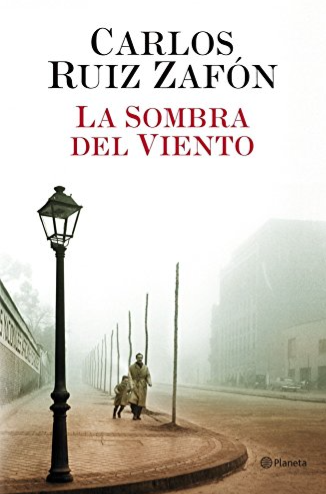-
Novel Review: “La Sombra del Viento”
Review by Lizzie Hammond, student of advanced Spanish.
Review of an amazing novel, although challenging and lenghty.
Congratulations to Lizzie for completing her reading and reviewing this book in both languages English and Spanish
“The Shadow of the wind” (“La Sombra Del Viento”), By Carlos Ruiz Zafón.

I have long been interested in literature, what it reveals about human nature and its relationship to time and place. I moved to Spain recently and decided not only to learn the language but to try to get to grips with aspects of the history and culture of my new homeland.
Many local friends grew up in Franco’s Spain, they occasionally talk about privations or missed opportunities, but they tend to veer away from discussion of the Civil War itself. So, for me La Sombre del Viento is not simply a compelling novel, but an insight into the lives of ordinary people living under a dictatorship.
The story centers on a motherless boy, Daniel, growing up in the aftermath of the Civil War with his father, the owner of a bookshop in Barcelona. Adrift from his friends and even his father, Daniel misses his mother dreadfully but cannot remember her face, a misery which adds both to his loneliness and guilt.
In an attempt to distract him, his father takes him to El Cementerio de Los Libros Olvidados where Daniel is allowed to choose a book. Before he takes a book, his father reminds him:
“Cada libro, cada tomo que ves, tiene alma. El alma de quien lo escribió, y el alma de quienes lo leyeron y vivieron y soñaron con él.“
Fascinated by the story, he refuses to sell the book, despite being offered a great deal of money due to its rarity and mystery. His determination leads him into a complicated and frightening journey of discovery. Every character has been affected by the war and its aftermath, all are secretive, many are fearful, some have profited from the conflict, and now, tainted by greed and cruelty, have lost any traits of social awareness and compassion.
This was a challenging read for me necessitating frequent references to the dictionary, particularly during the early chapters, but superbly written and utterly riveting, I was determined to battle on to the end. In the process I gained new insights into the effects of the war on the personalities and actions of those that lived through it and perhaps, a little more discernment the people of Spain.
— Review in Spanish —-
La Sombra del Viento, Carlos Ruiz Zafón
Me he interesado por mucho tiempo en literatura, lo que revela sobre la naturaleza humana y su relación con el tiempo y lugar. Me mudé a España hace poco y decidí no solamente aprender la lengua sino también para tratar de encarar aspectos de la historia y la cultura de mi nuevo país.
Muchos amigos locales crecieron en la España de Francisco Franco. A veces hablan sobre las privaciones o los oportunidades perdidas pero tienden a salirse del tema de la guerra civil. Así que para mi La Sombra del Viento no es simplemente una novela convincente pero una visión de la vida de la gente común que vive bajo una dictadura.
La historia se centra en un hijo sin madre, Daniel, quien crece posteriormente a la Guerra civil con su padre, el dueño de una librería en Barcelona. A la deriva de sus amigos e incluso su padre, Daniel extraña terriblemente a su madre pero no puede recordar su rostro, una miseria que se suma tanto a su soledad y su culpa.
En un intento de distraerlo, su padre lo lleva al Cementerio de Los Olvidados donde Daniel puede elegir un libro. Antes de que él tome un libro, el padre le recuerda
“Cada libro, cada tomo que ves, tiene alma. El alma de quien lo escribió, y el alma de quienes lo leyeron y vivieron y soñaron con él.“
Fascinado por la historia, se niega a vender el libro, a pesar de que se le ofreció una gran cantidad de dinero debido a su rareza y misterio. Su determinación lo lleva a un complicado y aterrador viaje de descubrimiento. Todos los personajes se han visto afectados por la guerra y sus secuelas, todos son reservados, muchos tienen miedo, algunos se han beneficiado del conflicto, y ahora, manchados por la codicia y la crueldad, han perdido cualquier rasgo de conciencia social y compasión.
Esto fue una lectura desafiante para mi que requirió referencias frecuentes al diccionario, particularmente durante los primeros capítulos, pero, magníficamente escrita y completamente fascinante. Estaba decidido a luchar hasta el final. En el proceso obtuve nuevos conocimientos sobre los efectos de la guerra en las personalidades y acciones de quienes la vivieron y quizás, un poco más de comprensión de los pueblos de España.








